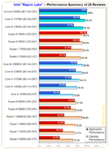With Ryzen I do. Articles
like this pop up fairly often, and I don't like the methodology. I'll go through it.
CPU Pricing and Value: Intel. No problems wit this. Though with the recent price cuts, It's probably a tie.
Gaming Performance: Intel. I'm fine with this for now.
Content Creation/Productivity: Intel. Should be a tie. Intel wins single thread, AMD multi thread. After those first graphs there are six (!) graphs comparing Alder Lake to Zen 3, which is not relevant anymore.
Specifications: Intel. This looks like nothing more than a repeat of CPU Pricing and Value. In other words, just a way to give Intel another win.
Overclocking: Intel. This one is just a mess. First it is ALL Alder Lake vs Zen 3. Alder Lake can eat tons of power, so of course there is more headroom. It should be compared to Zen 4 since they have much closer TDP's. Also, all AMD CPU's are unlocked whereas with Intel you need a K CPU and Z chipset. That alone makes me say this one should go to AMD.
Power Consumption: AMD. It's closer now with Zen 4 but still a win for AMD.
Drivers and Software: Intel. Not sure what this is supposed to even mean. I do know I've never seen AMD win or tie in it though so it seems it's there just to get another win. Both are generally just fine with the occasional problem now and then. I'd call it a tie.
Process Node: AMD. I agree. Not sure why it really matters though. Maybe to throw AMD a bone?
Architecture: Tie. I'm fine with that.
Security: AMD. I don't think it really matters to most people. A lot of the exploits are more theory it seems. But, AMD does have less of them.
So by my count, I'd give Intel 5 because I'd remove Specifications as a duplicate. AMD would get 7 or 8 depending on whether I included pricing. I would consider throwing away security to make it 6 or 7.
Here's the best part though (and by that I mean worst), the comments section starts over two years ago and is closed! Therefore no one can point out the flaws like I just did. Intel wins 7-4. It's the truth. You can't challenge it. Content Creation and Overclocking are the worst by far, IMHO.





